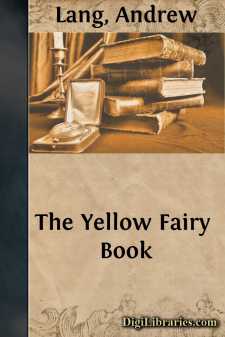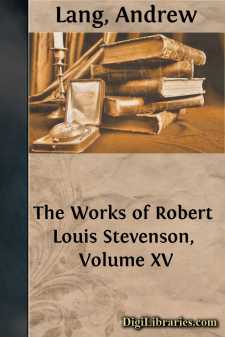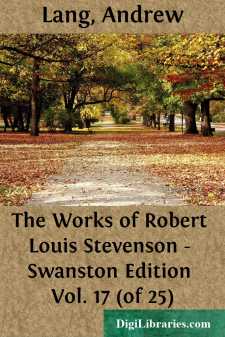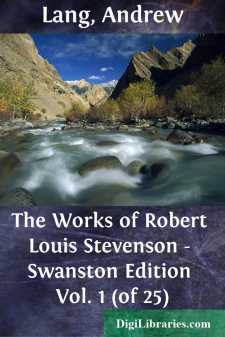Categories
- Antiques & Collectibles 13
- Architecture 36
- Art 48
- Bibles 22
- Biography & Autobiography 813
- Body, Mind & Spirit 142
- Business & Economics 28
- Children's Books 17
- Children's Fiction 14
- Computers 4
- Cooking 94
- Crafts & Hobbies 4
- Drama 346
- Education 46
- Family & Relationships 57
- Fiction 11829
- Games 19
- Gardening 17
- Health & Fitness 34
- History 1377
- House & Home 1
- Humor 147
- Juvenile Fiction 1873
- Juvenile Nonfiction 202
- Language Arts & Disciplines 88
- Law 16
- Literary Collections 686
- Literary Criticism 179
- Mathematics 13
- Medical 41
- Music 40
- Nature 179
- Non-Classifiable 1768
- Performing Arts 7
- Periodicals 1453
- Philosophy 64
- Photography 2
- Poetry 896
- Political Science 203
- Psychology 42
- Reference 154
- Religion 513
- Science 126
- Self-Help 84
- Social Science 81
- Sports & Recreation 34
- Study Aids 3
- Technology & Engineering 59
- Transportation 23
- Travel 463
- True Crime 29
Andrew Lang
Andrew Lang (1844-1912) was a Scottish poet, novelist, and literary critic, best known for his collections of fairy tales, notably the "Fairy Books" series, which includes titles like "The Blue Fairy Book" and "The Red Fairy Book." He was also a prolific scholar, contributing to the fields of anthropology, history, and folklore with works such as "Custom and Myth" and "Myth, Ritual, and Religion." Lang's work in popularizing folk and fairy tales has had a lasting influence on children's literature and the study of mythology.
Author's Books:
Sort by:
by:
Andrew Lang
PREFACE The Editor thinks that children will readily forgive him for publishing another Fairy Book. We have had the Blue, the Red, the Green, and here is the Yellow. If children are pleased, and they are so kind as to say that they are pleased, the Editor does not care very much for what other people may say. Now, there is one gentleman who seems to think that it is not quite right to print so many...
more...
by:
Andrew Lang
ACT I TABLEAU I The Double Life The Stage represents a room in the Deacon’s house, furnished partly as a sitting-, partly as a bed-room, in the style of an easy burgess of about 1780. C., a door; L.C., second and smaller door; R.C., practicable window; L., alcove, supposed to contain bed; at the back, a clothes-press and a corner cupboard containing bottles, etc. Mary Brodie at needlework; Old...
more...
by:
Andrew Lang
CHAPTER I AN ISLAND LANDFALL For nearly ten years my health had been declining; and for some while before I set forth upon my voyage, I believed I was come to the afterpiece of life, and had only the nurse and undertaker to expect. It was suggested that I should try the South Seas; and I was not unwilling to visit like a ghost, and be carried like a bale, among scenes that had attracted me in youth and...
more...
by:
Andrew Lang
STORY OF THE YOUNG MAN WITH THE CREAM TARTS During his residence in London, the accomplished Prince Florizel of Bohemia gained the affection of all classes by the seduction of his manner and by a well-considered generosity. He was a remarkable man even by what was known of him; and that was but a small part of what he actually did. Although of a placid temper in ordinary circumstances, and accustomed...
more...
by:
Andrew Lang
CHAPTER I IN WHICH JOHN SOWS THE WIND John Varey Nicholson was stupid; yet stupider men than he are now sprawling in Parliament, and lauding themselves as the authors of their own distinction. He was of a fat habit, even from boyhood, and inclined to a cheerful and cursory reading of the face of life; and possibly this attitude of mind was the original cause of his misfortunes. Beyond this hint...
more...
by:
Andrew Lang
THE SECOND CABIN I first encountered my fellow-passengers on the Broomielaw in Glasgow. Thence we descended the Clyde in no familiar spirit, but looking askance on each other as on possible enemies. A few Scandinavians, who had already grown acquainted on the North Sea, were friendly and voluble over their long pipes; but among English speakers distance and suspicion reigned supreme. The sun was soon...
more...
by:
Andrew Lang
THE SURNAME OF STEVENSON From the thirteenth century onwards, the name, under the various disguises of Stevinstoun, Stevensoun, Stevensonne, Stenesone, and Stewinsoune, spread across Scotland from the mouth of the Firth of Forth to the mouth of the Firth of Clyde. Four times at least it occurs as a place-name. There is a parish of Stevenston in Cunningham; a second place of the name in the Barony of...
more...
by:
Andrew Lang
CHAPTER I THE ELEMENTS OF DISCORD: NATIVE The story I have to tell is still going on as I write; the characters are alive and active; it is a piece of contemporary history in the most exact sense. And yet, for all its actuality and the part played in it by mails and telegraphs and iron war-ships, the ideas and the manners of the native actors date back before the Roman Empire. They are Christians,...
more...
by:
Andrew Lang
VII October 1882—August 1884 In the two years and odd months since his return from California, Stevenson had made no solid gain of health. His winters, and especially his second winter, at Davos had seemed to do him much temporary good; but during the summers in Scotland he had lost as much as he had gained, or more. Loving the Mediterranean shores of France from of old, he now made up his mind to...
more...
by:
Andrew Lang
So much has been written on R. L. Stevenson, as a boy, a man, and a man of letters, so much has been written both by himself and others, that I can hope to add nothing essential to the world's knowledge of his character and appreciation of his genius. What is essential has been said, once for all, by Sir Sidney Colvin in "Notes and Introductions" to R. L. S.'s "Letters to His...
more...











